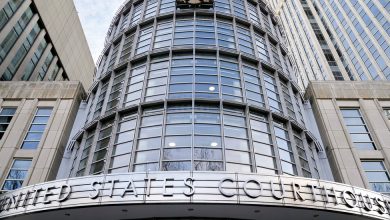Michigan Judge Suspends an Abortion Ban From 1931

A Michigan judge has pre-emptively blocked enforcement of a 1931 law that would ban abortions in almost all cases if the Supreme Court takes an expected step to overturn the constitutional right to abortion.
Chief Judge Elizabeth Gleicher of the State Court of Claims issued an injunction on Tuesday as a part of a lawsuit brought by Planned Parenthood of Michigan that argues that the nearly century-old law violates the State Constitution.
“The court finds a strong likelihood that the plaintiffs will prevail on the merits of their constitutional challenge,” Judge Gleicher wrote. “A preliminary injunction furthers the public interest, allowing the court to make a full ruling on the merits of the case without subjecting the plaintiffs and their patients to the impact of a total ban on abortion services in this state.”
The injunction means that even if Roe v. Wade were overturned, Michigan’s law would not go back into effect until Planned Parenthood’s lawsuit is resolved. The complaint was made against Attorney General Dana Nessel, who has said she would not enforce the 1931 law even if Roe were overturned. However, she is up for re-election in November, and those who support abortion rights are concerned that future leaders could enforce a criminal ban.
Ms. Nessel said she would not appeal the ruling and called the injunction “a victory for the millions of Michigan women fighting for their rights.” Gov. Gretchen Whitmer, who is also running for re-election and has filed a separate lawsuit looking to block the enforcement of the 1931 law, praised the decision as an “important victory for Michiganders.”
The Supreme Court appears poised to overturn Roe, based on a leaked draft of the opinion regarding a case about a 15-week abortion ban in Mississippi. Removing Roe’s constitutional protections on abortion would give the states individual control over whether to permit the procedure. Although an official ruling has not been issued, the leak amplified a political and legislative storm. Some states pushed harder on efforts to restrict abortion, while others scrambled to lock in abortion rights.
The law in Michigan has been dormant since the Roe decision in 1973 made it obsolete. The law makes providing an abortion in the state a felony unless the life of the pregnant woman is at risk.
In addition to Michigan, eight other states — Alabama, Arizona, Arkansas, Mississippi, Oklahoma, Texas, West Virginia and Wisconsin — have pre-Roe bans in place, according to the Guttmacher Institute, a research organization that supports abortion rights.
“For the last two weeks since the leak of the Supreme Court draft, I’ve been dreading the day I might wake up and abortion would be illegal in Michigan,” said Sarah Wallett, the chief medical officer at Planned Parenthood of Michigan. She said the injunction gave her hope that the merits of the group’s case were considered strong.
Bonsitu Kitaba, the deputy legal director at the American Civil Liberties Union of Michigan, which was part of the Planned Parenthood lawsuit, said she was elated by the injunction.
The State of Roe v. Wade
What is Roe v. Wade? Roe v. Wade is a landmark Supreme court decision that legalized abortion across the United States. The 7-2 ruling was announced on Jan. 22, 1973. Justice Harry A. Blackmun, a modest Midwestern Republican and a defender of the right to abortion, wrote the majority opinion.
What was the case about? The ruling struck down laws in many states that had barred abortion, declaring that they could not ban the procedure before the point at which a fetus can survive outside the womb. That point, known as fetal viability, was around 28 weeks when Roe was decided. Today, most experts estimate it to be about 23 or 24 weeks.
What else did the case do? Roe v. Wade created a framework to govern abortion regulation based on the trimesters of pregnancy. In the first trimester, it allowed almost no regulations. In the second, it allowed regulations to protect women’s health. In the third, it allowed states to ban abortions so long as exceptions were made to protect the life and health of the mother. In 1992, the court tossed that framework, while affirming Roe’s essential holding.
What would happen if Roe were overturned? Individual states would be able to decide whether and when abortions would be legal. The practice would likely be banned or restricted heavily in about half of them, but many would continue to allow it. Thirteen states have so-called trigger laws, which would immediately make abortion illegal if Roe were overturned.
“We know that there were prosecutors ready to prosecute individuals under this law, and now we can just breathe a sigh of relief,” Ms. Kitaba said.
Alliance Defending Freedom, a conservative Christian legal organization representing two anti-abortion groups in the state, Right to Life of Michigan and the Michigan Catholic Conference, spoke out against Tuesday’s decision.
John Bursch, senior counsel with Alliance Defending Freedom, said in a news conference that the judge “engaged in an analysis without any advocacy from the other side, and she was demonstrably wrong in her legal conclusions.”
He argued that the case should be dismissed because both parties, the Michigan attorney general and Planned Parenthood, agreed on the questions of the case. He also called into question Judge Gleicher’s impartiality, pointing to donations she had made to Planned Parenthood.
Abortion rights activists in Michigan are also looking to add a ballot measure to the November election that would amend the State Constitution to include a right to abortion. They must collect 425,029 signatures to make it on the ballot.




